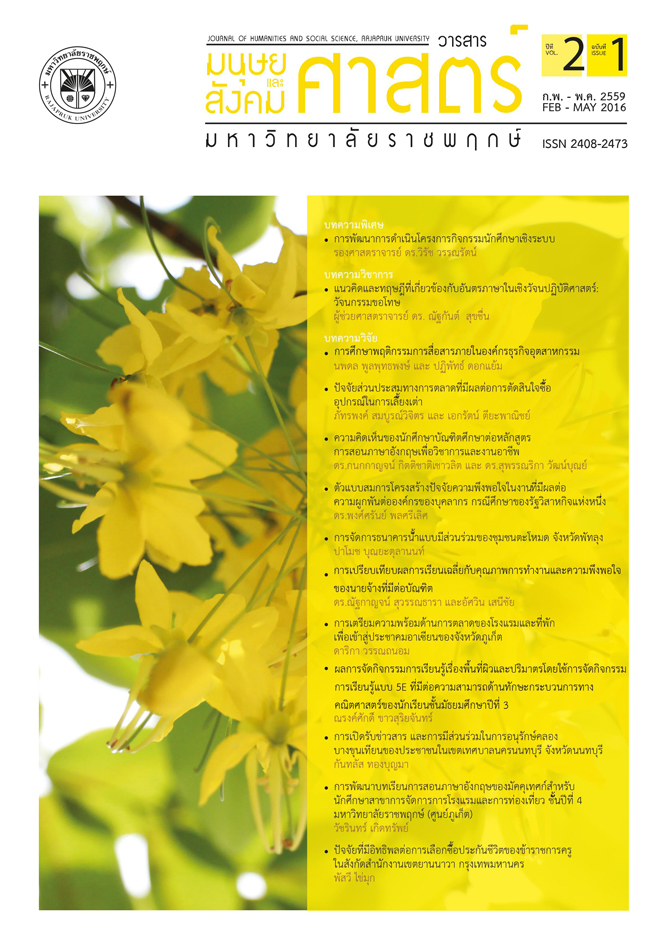The Development of Supplementary English Lessons of Tour Guides for Fourth Year Students in Majoring of Hotel and Tourism Management at Rajapruk University (Phuket Center)
Main Article Content
Abstract
The purpose of this research was to test the effectiveness of supplementary English
lessons of tour guides for fourth year students in majoring of hotel and tourism
management at Rajapruk University (Phuket center) and to study the students’
satisfactions toward the materials. The sample consisted of 80 fourth year students
of business administration in Hotel and Tourism Management at Rajapruk University
(Phuket Center).
The material was the five lessons in English for Tour Guide 2 course. The students
were given an exercise after the completions of each lesson. After the conclusion of
all 5 lessons, the students were given a posttest. The both data from exercises and
posttest were analyzed for effectiveness by using E1/E2 or 80/80. Additionally, a
questionnaire was given to the students by following each lesson. The mean and
standard deviation of the questionnaire scores were used to assess the students’
satisfactions toward the materials.
The findings were revealed that the effectiveness of the supplement English lesson
of tour guides was 80.125 and 80.541. This means that the constructed materials
were highly effective. Additionally, the students’ satisfactions toward the five English
lessons of tour guides were highly positive. As the mean of content was 4.030, lesson
format was 3.982, advantage was 3.910 and activity was 3.905.
Article Details
References
ฉันทัช วรรณถนอม. (2551). หลักการมัคคุเทศก์.กรุงเทพฯ: มหาวิทยาลัยราชภัฎสวนสุนันทา.
ชุติมา กองถัน. (2556). การพัฒนาทักษะการพูดภาษาอังกฤษเพื่อการท่องเที่ยวโดยใช้ภาพชุด ประกอบการบรรยายแนะนาแหล่งท่องเที่ยวและสถานการณ์จาลองในจังหวัดเพชรบูรณ์ สาหรับนักศึกษามหาวิทยาลัยราชภัฏเพชรบูรณ์. ค้นเมื่อ 25 กุมภาพันธ์ 2559, จาก http://research.pcru.ac.th/rdb/pro_data/files/5602009.pdf
ชัยยงค์ พรหมวงศ์.(2556).การทดสอบประสิทธิภาพสื่อหรือชุดการสอน. วารสารศิลปากร
ศึกษาศาสตร์วิจัย, ปีที่ 5 (ฉบับที่ 1), หน้า 7-14.
ณัฎฐ์นรี ฤทธิรัตน์. (2557). ปัญหาและอุปสรรคในการพัฒนาทักษะการพูดภาษาอังกฤษของนักศึกษาไทย. ค้นเมื่อ 19 กุมภาพัน ธ์ 2559, จา ก http://gsbooks.gs.kku.ac.th/57/grc15/files/hmp39.pdf
นิศา ชัชกุล. (2554). อุตสาหกรรมการท่องเที่ยว. กรุงเทพฯ: สำนักพิมพ์แห่งจุฬาลงกรณ์มหาวิทยาลัย
พิณสุดา สิริธรังศรี. (2555). การจัดการศึกษาแบบมีส่วนร่วมขององค์กรในชุมชนประสบการณ์การ เรียนรู้จาการปฏิบัติ. กรุงเทพฯ: ภาพพิมพ์.
พิมพรรณ รังสิกรรพุม.(2553).การจัดการมัคคุเทศก์ท้องถิ่นโดยชุมชนบนพื้นที่สูง ตำบลทุ่งสมอ อำเภอเข้าค้อ จังหวัดเพชรบูรณ์. ค้นเมื่อ 25 กุมภาพันธ์ 2559, จาก
http://research.pcru.ac.th/rdb/pro_data/files/5203001.pdf
พัชราพร รัตนวโรภาส.(2555).สภาพและปัญหาการจัดการเรียนการสอนวิชา ENG321
ภาษาอังกฤษเพื่อการสื่อสารมวลชน สาขาวิชาภาษาอังกฤษสื่อสารธุรกิจ. ค้นเมื่อ 25 กุมภาพันธ์ 2559, จาก http://www.spu.ac.th/liberal-arts/files/2013/08/4.1-2-2-2 รายงานวิจัยENG321.pdf
ยงยุทธ แฉล้มวงษ์. (2557). แรงงานไทยในบริบทใหม่เมื่อเปิดประชาคมอาเซียน.ค้นเมื่อ 25 กุมภาพันธ์ 2559, จาก http://tdri.or.th/tdri-insight/thai-labour-in-aec-context/
วรรณสิริ โมรากุล.(2558).สรุปสถานการณ์ท่องเที่ยวปี 2558 ฐานเศรษฐกิจ. ค้นเมื่อ 19 กุมภาพันธ์ 2559, จาก http://www.thansettakij.com/2016/01/08/25115
Education First. (2014). EF English Proficiency Index 2015.Retrieved February 25,2016, from http://www.ef.co.th/epi/
Hutchinson and Waters. (1989). English for Specific Purposes. Cambridge:Cambridge University Press.
Likert, R. (1932). A technique for the measurement of attitudes. Archives of Psychology 140:1–55.
Nunan D.(1995).Designing Tasks for the Communicative Classroom. Cambridge: Cambride University press.
Robinson P.C.(1991). ESP Today : A Practitioner’s Guide. New York:Prentice Hall.Savignou,
S. J. (1983). Communicative Competence:Theory and Classroom.
Strevens P.(1997).Special-Purpose Language Learning: A Perspective.Language Teaching and Linguistics 10.


